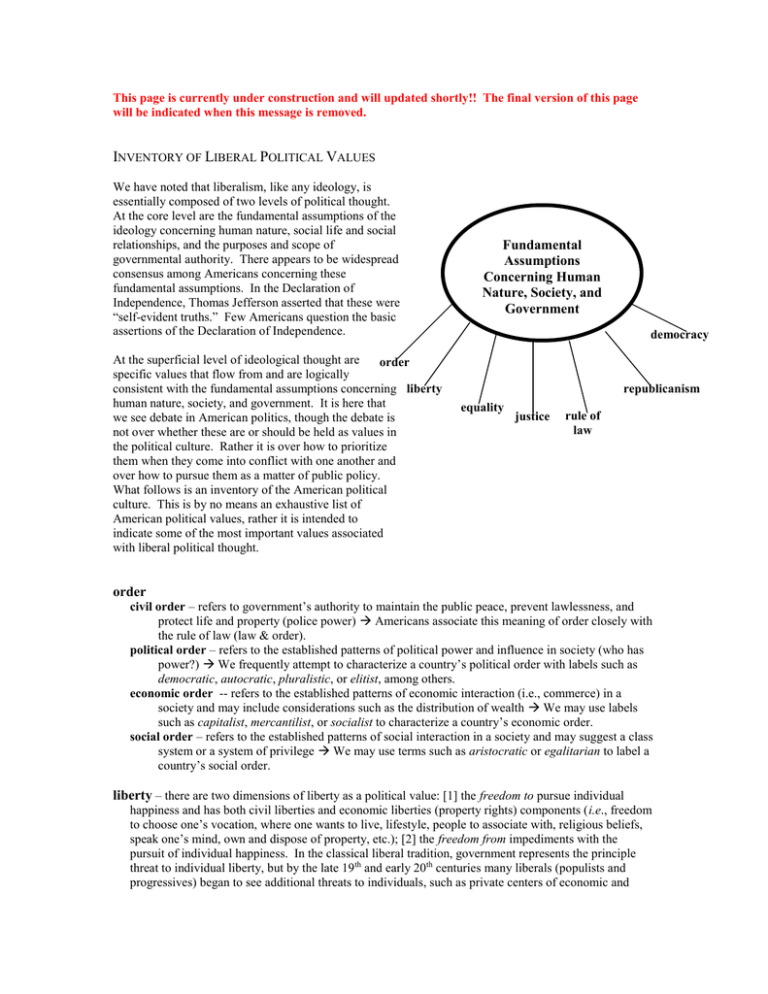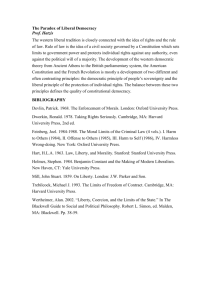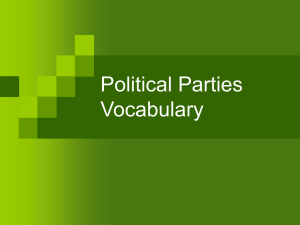This page is currently under construction and will updated shortly!! ... will be indicated when this message is removed.
advertisement

This page is currently under construction and will updated shortly!! The final version of this page will be indicated when this message is removed. INVENTORY OF LIBERAL POLITICAL VALUES We have noted that liberalism, like any ideology, is essentially composed of two levels of political thought. At the core level are the fundamental assumptions of the ideology concerning human nature, social life and social relationships, and the purposes and scope of governmental authority. There appears to be widespread consensus among Americans concerning these fundamental assumptions. In the Declaration of Independence, Thomas Jefferson asserted that these were “self-evident truths.” Few Americans question the basic assertions of the Declaration of Independence. At the superficial level of ideological thought are order specific values that flow from and are logically consistent with the fundamental assumptions concerning liberty human nature, society, and government. It is here that we see debate in American politics, though the debate is not over whether these are or should be held as values in the political culture. Rather it is over how to prioritize them when they come into conflict with one another and over how to pursue them as a matter of public policy. What follows is an inventory of the American political culture. This is by no means an exhaustive list of American political values, rather it is intended to indicate some of the most important values associated with liberal political thought. Fundamental Assumptions Concerning Human Nature, Society, and Government democracy republicanism equality justice rule of law order civil order – refers to government’s authority to maintain the public peace, prevent lawlessness, and protect life and property (police power) Americans associate this meaning of order closely with the rule of law (law & order). political order – refers to the established patterns of political power and influence in society (who has power?) We frequently attempt to characterize a country’s political order with labels such as democratic, autocratic, pluralistic, or elitist, among others. economic order -- refers to the established patterns of economic interaction (i.e., commerce) in a society and may include considerations such as the distribution of wealth We may use labels such as capitalist, mercantilist, or socialist to characterize a country’s economic order. social order – refers to the established patterns of social interaction in a society and may suggest a class system or a system of privilege We may use terms such as aristocratic or egalitarian to label a country’s social order. liberty – there are two dimensions of liberty as a political value: [1] the freedom to pursue individual happiness and has both civil liberties and economic liberties (property rights) components (i.e., freedom to choose one’s vocation, where one wants to live, lifestyle, people to associate with, religious beliefs, speak one’s mind, own and dispose of property, etc.); [2] the freedom from impediments with the pursuit of individual happiness. In the classical liberal tradition, government represents the principle threat to individual liberty, but by the late 19th and early 20th centuries many liberals (populists and progressives) began to see additional threats to individuals, such as private centers of economic and political power (large corporations), poverty, and discriminatory practices. Liberty is a preeminent value in a liberal political culture (“Give me liberty or give me death!”). Note the common root of the words liberal and liberty. equality – in the American political culture, equality clearly implies that individuals should have substantially equal opportunities (equality of opportunity) to pursue their choices and achieve according to their talents and abilities rather than the idea that individuals should receive substantially equal shares of the benefits of social life (equality of outcomes or equality of results) justice rule of law republicanism democracy localism property personal achievement competitive individualism This page is currently under construction and will updated shortly!! The final version of this page will be indicated when this message is removed.





